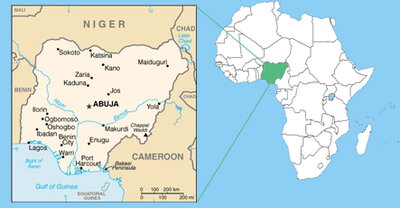

Region: Western Africa
Quick Facts:
- Population: 130.2 million
- Capital: Abuja (largest city is Lagos)
- Area: 356,669 sq miles (About twice as big as California)
- Major Languages: English (official), Yoruba, Ibo, Hausa
- Life Expectancy: 55.34 years (men), 58.09 years (women)
- Literacy: 39.3%
- Monetary unit: 1 Nigerian Naira= 100 kobo
- Exchange Rate: US $1= 144 NGN (January 10, 2009)
- Income (GDP) per capita: $560 (constant 2000 international $, WDI 2005)
- Urban population: 49% of total population
- Paved roads: 39% of total road surface
- Electric Power Consumption (per capita): 1296 kWH
- Fixed line and mobile phone subscribers: 140 per 1,000 people
- Internet Users: 35 per 1,000 people
- Internet Domain: .ng
- Country Code: +234
- Time Difference: GMT +1 (7 hours ahead of Illinois during Standard Time)
- Climate: Tropical. Hottest month is March (75-92F ), coolest month is August (68-78F)
- Type of Government: Presidential Federal Republic
- President: Umaru Yar'Adua
Possible Travel Warning:
The US State department may have a travel warning in effect for Nigeria. Please check the list of current travel warnings.
Historical and Socio-Political Background:
British influence and control over what would become Nigeria grew through the 19th century and remained until October 1960, when it became an independent country. Its first government was a conservative coalition. Nigeria declared itself a Federal Republic in 1963, a move which was followed by several years of instability including back-to-back military coups in 1966. Nigeria’s oil deposits caused it to join the OPEC during the 1970 oil boom. Unfortunately, much of the billions of dollars of earning were squandered by corrupt governments. For many years the country was mired in a cycle of democratically elected governments being overthrown in military coups.
From July 1967 to January 1970, Nigeria was caught up in a civil war known as the Biafran war. This war was the result of the attempted secession of southeastern provinces of Nigeria. An estimated three million people died in this conflict, however, reconstruction was swift and aided by oil money. Nigeria remained under military rule for the following thirty years.
Political liberalization ushered in a return to civilian rule in 1999. However, this change has been concurrent with an increase in violent dissent by religious and ethnic militants as well as civilians. Communal rivalry of the last few years has resulted in thousands of deaths. The imposition of Islamic law in several states has caused Christians to flee.
Although the April 2003 elections were marred by some irregularities, Nigeria is currently experiencing its longest period of civilian rule since independence. General elections in April 2007, although considered significantly flawed by Nigerian and international observers, marked the first civilian-to-civilian transfer of power in the country's history.
Travelers to the region should be aware that, since the early 1990s, there has been conflict in the Niger Delta arising from tensions between foreign oil corporations and ethnic minorities. Competition for oil revenues between ethnic minorities has caused the militarization of much of the region.
Northern Nigeria has been governed by Islamic religious law known as Sharia. The New York Times in a 2007 article notes that while a violent morality police governed these provinces even recently, they are now reduced to the capacity of "crossing guards". The practice of Sharia seems to have left the public sphere of life.
The adult prevalence rate of HIV/AIDS in Nigeria is 3.1 percent of the population, and 170,000 HIV/AIDS deaths were estimated in 2003. There is also a very high risk of major infectious diseases, including hepatitis A, diarrhea, and malaria.
Economy:
Nigeria’s largest industry and greatest contributor to GDP is the extraction and drilling of petroleum. Much of the oil industry, however, is located in the Niger Delta, and may be subject to the conflict mentioned above. Nonetheless, as of 2006, petroleum exports accounted for over 95 percent of the country’s export earnings, and almost half of the country’s GDP. Nigeria has proven oil reserves between 16 and 22 billion barrels.
Starting 2003, Nigeria is attempting an economic overhaul via trade liberalization, deregulation, and privatization. Agriculture remains the mainstay of the Nigerian economy, accounting for 26.8 percent of the GDP 26.8 percent of the GDP in 2005. Livestock production, fisheries, cocoa production, and tapioca (cassava) are some of the major agricultural products grown here.
The oil boom of the 1970s led to a decline in agriculture, and even as recently as 2000, oil and gas exports accounted for over 98 percent of export earnings. Nigeria is estimated to have 35 billion barrels of oil, and over 100 trillion sq. feet of natural gas. As mentioned above, Nigeria is a member of the OPEC.
The services sector in Nigeria is crippled by low power and telecom density. The economic reforms of the 1990s initially hampered the performance of the banking sector, but new banks have entered the financial market in the last few years, leading to significant growth in this sector.
Trade Information:
- Exports: $56.46 billion (2006 est.)
- Export Goods: Petroleum and allied products, cocoa, rubber
- Main Export Partners (2006): USA (48.9%), Spain (8%), Brazil (7.3%)
- Imports: $26.91 billion (20006 est.)
- Import Goods: Food items, capital goods, fuels
- Main Import Partners (2006): China (10.7%), US (8.4%), Netherlands (6.2%)
Resources for Businesses:
Nigerian Embassy, Washington, D.C.
2112 Wyoming Avenue, NW
Washington DC, 20008
Tel: (202) 234 0540, 0541
Fax: (202) 332 6315
Legal Framework to Doing Business in Nigeria
Information from the Nigerian Embassy
Nigeria Pre-shipment Inspection Program
Information from the Nigerian Embassy
Lagos Chamber of Commerce and Industry
the Premier Chamber of Commerce in Nigeria
International Chamber of Commerce in Nigeria
Last updated on 04/15/2009